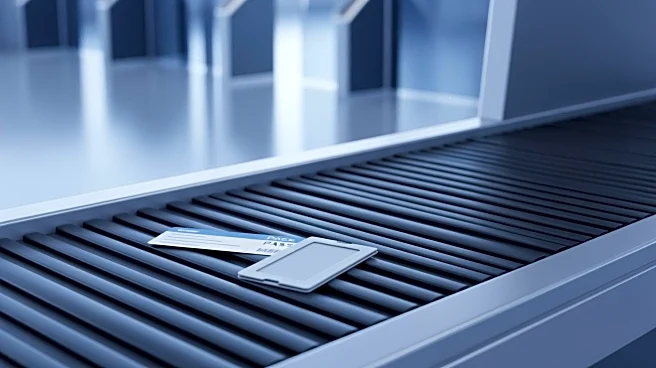What's Happening?
The Transportation Security Administration (TSA) has proposed a new rule that would impose an $18 fee on travelers who do not possess a REAL ID or passport when passing through TSA checkpoints. This fee is intended to fund a new biometric kiosk system
designed to verify the identities of travelers without the required identification. The proposed rule is set to be published in the Federal Register, initiating a public comment period. The REAL ID Act, enacted by Congress in 2005 following the 9/11 attacks, mandates enhanced security standards for state-issued driver's licenses and identification cards. Despite numerous delays, the Department of Homeland Security began enforcing the REAL ID requirement for domestic flights in May 2025. The TSA's new system aims to streamline the identity verification process, although travelers using alternative forms of ID may still face additional security screenings and potential delays.
Why It's Important?
The introduction of the $18 fee and biometric verification system represents a significant shift in airport security protocols, potentially affecting millions of travelers across the United States. The REAL ID requirement has been a long-standing issue, with many states struggling to comply with the federal standards. The fee could serve as an incentive for travelers to obtain a REAL ID, thereby enhancing national security by ensuring more reliable identification methods. However, the fee may also pose a financial burden on travelers who have not yet acquired a REAL ID, particularly those who travel frequently. The TSA's move to modernize its identity verification process reflects broader efforts to improve security and efficiency at airports, but it also raises questions about privacy and the handling of biometric data.
What's Next?
The publication of the proposed rule in the Federal Register will open a period for public comment, allowing stakeholders and the general public to express their views on the fee and the new system. TSA will likely review these comments before finalizing the rule. In the meantime, travelers should prepare for potential changes in security procedures and consider obtaining a REAL ID to avoid the fee. The TSA has indicated that further guidance will be provided in the coming days, which may include details on the implementation timeline and additional security measures. Stakeholders, including airlines and airport authorities, will need to adapt to these changes and may play a role in facilitating the transition to the new system.
















